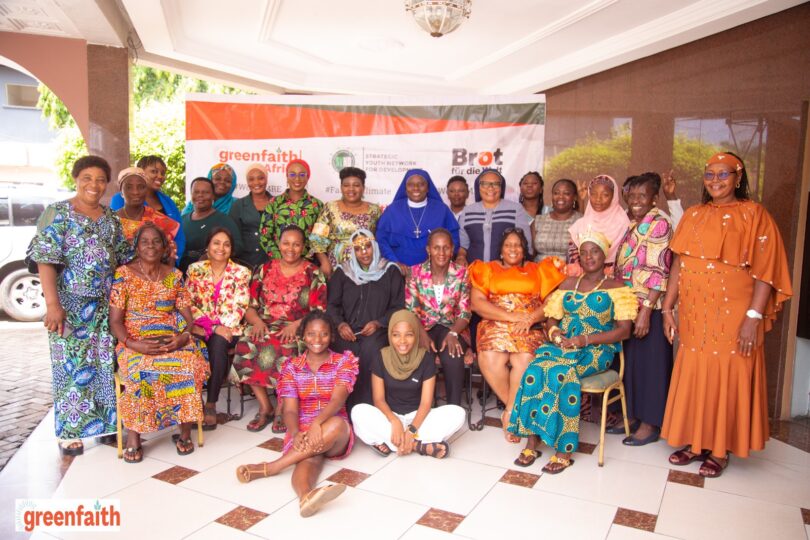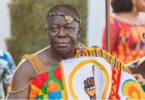Report By: Ishmael Barfi
African Governments have been called upon to stop new fossil fuels projects and to empower and support locally owned renewable energy initiatives in the fight against the numerous challenges of the climate crisis.
According to African Women of Faith in Energy, the halt will help the healing process and restoration of the African continent.
The call was in a communique issued by the Grassroots Women of Faith in Energy from Africa at a 2-days workshop.
The 2-day workshop from 27th to 28th May, dubbed “African Women of Faith in Energy Movement was organised by GreenFaith Africa (Ghana chapter) and their partner Strategic Youth Network for Development (SYND).
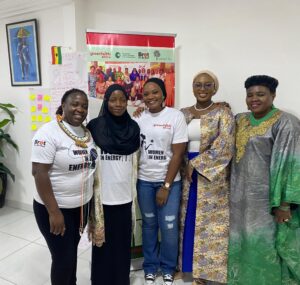
Group picture of some of the women at the Workshop
The 2-days workshop was in line with Greenfaith Africa’s empowering women of faith from the Grassroots to end Climate injustices across Africa
The workshop was also to build an African multi-faith women-led movement to champion the phasing out of fossil fuels on the African continent.
In addition, over 85% of fossil fuels produced by Africa-based projects are exported, thereby failing to increase the continent’s energy access rates. However, fossil fuel exploration often exacerbates climate change and social inequalities, leading to land grabs, biodiversity loss, environmental pollution, displacement, loss of livelihood, conflicts, health complications, human rights violation, and abuse, hence our demand for locally owned, accessible, affordable, clean women led renewable energy initiatives.
It is against this background that African women from Ghana, Nigeria, Kenya, Uganda, Tanzania, and Democratic RC, coming from different faith communities; Christians, Muslims, Hindus, and Traditional leaders, have called on their national governments, and insurance companies, the fossil fuel and extractive corporations and financial institutions especially Ghana Gas, ENI, Total Energies, CNOOC, Quantum, and Shell to clean up their mess, pay up and leave their communities, because women have suffered enough from their actions”.
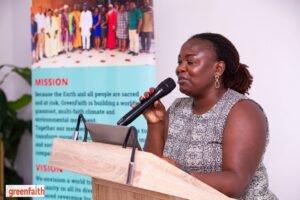
Meryne Warah, Global Organizing director
Greenfaith Africa
The Communique further demanded reparations believing that this would help the continent address the challenges of the climate crisis as a result of mining, fossil fuels exploration, and exploitation.
Furthermore, the African Women of Faith in Energy believed this “will enable our land to heal while coping with the consequences of their actions. As African women of faith representing our respective communities from across Africa, we are deeply concerned, angry, sad, and frustrated about the consequences of the irresponsible extractive actions of the fossil fuel industries on our land, biodiversity, livelihoods, health, and the future of our children”.
Though some African leaders, along with the fossil fuel industry, argue that oil and gas are the answer to Africa’s development problems, the African Women of Faith claimed that fossil fuel exploration has not benefited Africa due to exploitation by European, North American, Chinese extractive firms, financial institutions, national governments combined with weak African regulatory, legal and economic systems which promote corruption.
The African Women of Faith in Energy believes that they have a duty and a responsibility to speak out against these atrocities carried out by the extractive and fossil fuel industries in the name of development, at the expense of the women, children, and communities.

SYND Deputy Coordinator Solomon Yamoah in chat with some of the participants
Therefore at the end of the 2-day workshop, the African Women of Faith in Energy adopted the following:
1. Stop New Fossil Fuels Projects and Supporting Locally Owned Renewable Energy for Africa Women
We recognize that access to affordable energy is a fundamental challenge that the African continent, especially Women, is facing even after the extraction of the critical resources needed to transform it.
● Urgent Stop to new fossil fuel projects and related finance, upscaling a just transition; clean energy that is affordable, accessible, and locally owned.
● We call for action from all governments and institutions accountable to faith communities and women to support the bid for a Just Energy Transition in Africa, while promoting inclusivity, equity, and access to Renewable Energy.
2. Innovative Climate Finance
We acknowledge that there has not been adequate financial support directed to the African Women in the continent despite numerous commitments on reparation from the developed countries to avail the same. The Africa Women of Faith presents an opportunity for the international financial community to move beyond rhetoric and avail the much-needed climate finance for Africa.
● We urge African leaders to develop and implement innovative climate finance that is accessible and beneficial to the most vulnerable and marginalized frontline communities and women who are at the highest risk from the climate crisis and extractions.
● Increase funding and financial mechanisms to support women-led initiatives in renewable energy projects.
3. Inclusive Energy Policies:
● We advocate for energy policies that prioritize the needs and perspectives of women of faith in Africa, ensuring they are active participants in decision-making processes at all levels.
● Recognise, strengthen, and involve the local women-led structures in all the decision-making processes
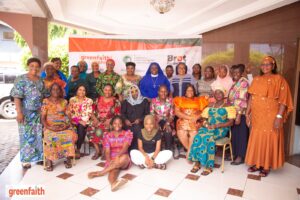
Group picture of participants
Loss and Damage
According to the latest IPCC report, Africa, especially women are confronted with the severe adverse effects of human-induced climate change such as mining and oil explorations, compared to most other regions of the world due to a relatively low adaptive capacity.
● Deliver concrete actions and recognize the profound impacts of climate change on vulnerable communities, especially women, and the need for urgent action to address loss and damage that targets the frontline communities across Africa.
● Operationalise the loss & damage to make it accessible promptly to grassroots women
● Urgent call and emphasize the moral obligation of governments and institutions to provide support and just reparations to those suffering from the adverse effects of climate change e.g floods
4. Green Jobs
● Develop and ensure that green job opportunities are accessible to all, particularly women and marginalized communities, to promote economic inclusion and social equity.
● Deliver concrete actions that support initiatives that provide training and education for women to equip them with the knowledge and skills needed for green jobs, enterprise, and sustainable practices.
● Promote community-centric approaches to green job creation that align with women, local needs, and religious and cultural values.
Source: www.thenewindependentonline.com


